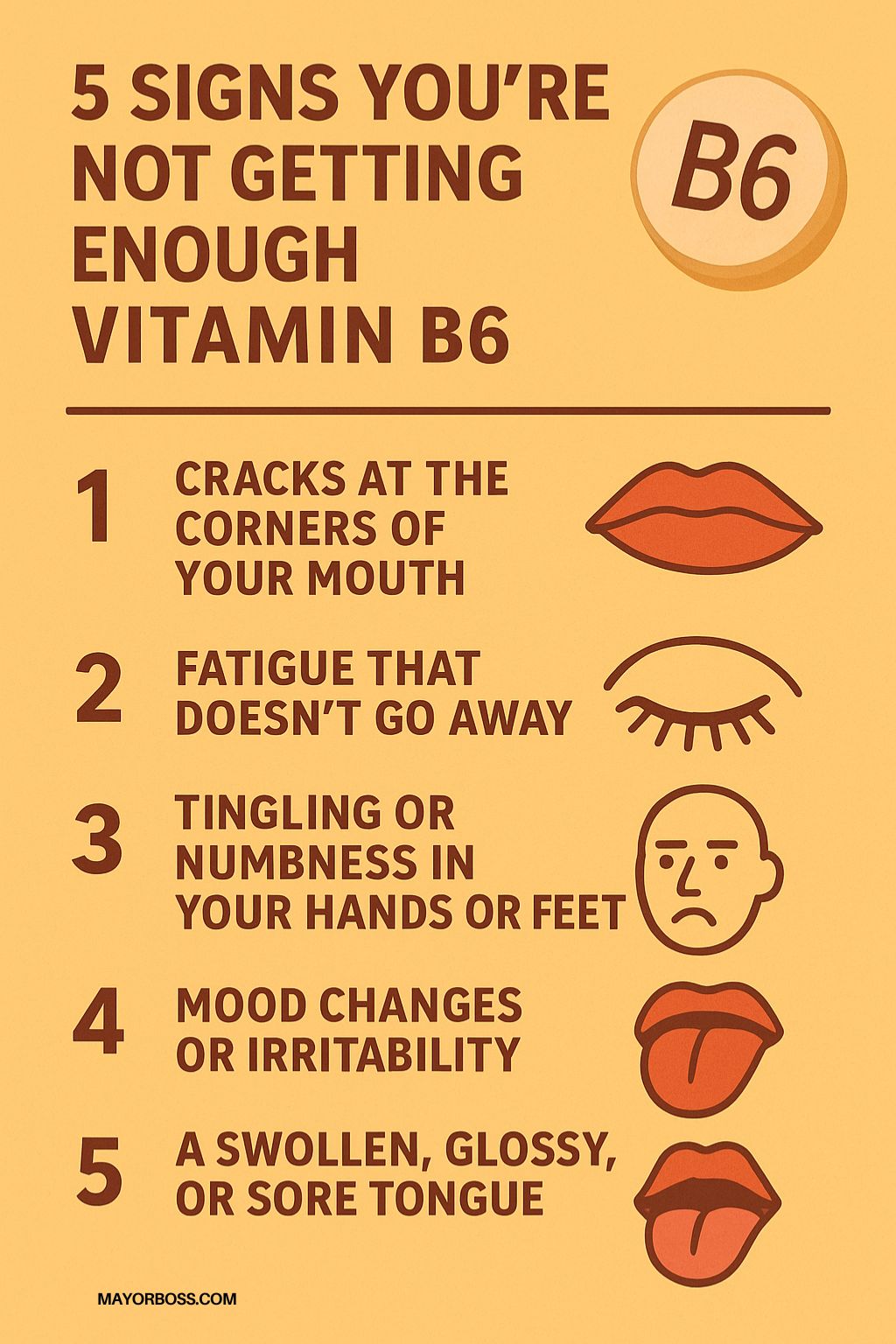5 Signs You’re Not Getting Enough Vitamin B6
Vitamin B6 deficiency can affect your brain, skin, immune system, and more. Here’s how to tell if you might be low.

Vitamin B6, also known as pyridoxine, is a water-soluble vitamin that plays a key role in how your body uses energy from food. It also supports brain function, nerve health, and the production of red blood cells. If you don’t get enough, your body can show several warning signs—some of which are easy to overlook.1
Here are the five most common signs that you might not be getting enough Vitamin B6.
1. Cracks at the Corners of Your Mouth
Do the corners of your lips feel sore, dry, or split open?
This condition, called angular cheilitis, is a classic sign of B6 deficiency. The skin at the edges of your mouth can become red, inflamed, and painful, especially when you smile or eat.
This happens because your body needs B6 to keep skin healthy. Without enough of it, the tissue struggles to heal, and bacteria or fungi can settle into the cracks, making things worse.
If you notice this regularly, especially along with dry lips or a swollen tongue, it’s worth looking at your diet.2
2. Fatigue That Doesn’t Go Away
Feeling tired all the time—even after a full night’s sleep?
Low B6 levels may be part of the reason. Your body needs this vitamin to make hemoglobin, the protein in red blood cells that carries oxygen throughout your body. When you don’t have enough hemoglobin, your cells don’t get the oxygen they need, and you feel drained.
This kind of fatigue tends to be constant. It’s not just from stress or missing a meal. It can make everyday tasks feel like a struggle.
People who are borderline deficient may not even realize their low energy has a physical cause—until they improve their vitamin levels and feel the difference.
3. Tingling or Numbness in Your Hands or Feet
Ever get pins and needles for no clear reason?
Vitamin B6 plays a major role in keeping your nerves healthy. If your levels are too low, the protective covering around nerves can break down. This causes sensations like tingling, numbness, or burning, often in the hands, arms, feet, or legs.
This is called peripheral neuropathy, and if left unaddressed, it can become more serious over time.
You might also notice muscle weakness or trouble with coordination. If you’ve ruled out diabetes or other conditions, a vitamin B6 deficiency could be the reason.
4. Mood Changes or Irritability
Feeling more anxious, down, or moody lately?
B6 helps your body make important brain chemicals, including serotonin and dopamine. These chemicals affect how you feel, sleep, and respond to stress.
Low B6 levels can lead to mood swings, irritability, depression, and even confusion. Some people also report increased anxiety or trouble sleeping.
Your mental health and brain function are closely tied to your nutrition. When key nutrients like B6 are missing, it shows—not just physically, but emotionally too.3
5. A Swollen, Glossy, or Sore Tongue
A healthy tongue is pink and covered with tiny bumps called papillae. When you’re low in B6, your tongue might become swollen, inflamed, or smooth. This is known as glossitis.
You may feel burning, soreness, or discomfort when eating certain foods, especially spicy or acidic ones.
Along with glossitis, people often notice a dry mouth or trouble swallowing. These symptoms point to inflammation in the tissues that line your mouth and throat, which rely on vitamin B6 to stay healthy.
Who’s at Risk of Vitamin B6 Deficiency?
While most people get enough B6 from their diet, some groups are more likely to develop a deficiency:
- Older adults – absorption can decrease with age
- People with kidney disease or liver disease
- Alcoholics – alcohol lowers B6 levels in the body
- People with autoimmune disorders – like rheumatoid arthritis or celiac disease
- Those taking certain medications – like isoniazid, hydralazine, or oral contraceptives
Even if your diet looks balanced, underlying conditions or medications can interfere with how your body processes B6.
What to Eat for More Vitamin B6
Vitamin B6 is found in a variety of foods, both animal and plant-based. Some of the best sources include:
- Chicken, turkey, and beef liver
- Fish, such as salmon and tuna
- Bananas
- Chickpeas
- Potatoes
- Fortified cereals
- Spinach
Your body doesn’t store B6 for long, so regular intake is important. Cooking or processing can reduce the B6 content of some foods, so eating fresh and minimally processed items is best.
When to See a Doctor
If you notice several of these symptoms and they don’t improve with diet changes, speak with your healthcare provider. A simple blood test can confirm whether you have a deficiency.
In some cases, your doctor may recommend B6 supplements, especially if you have a condition that affects absorption.
Avoid self-dosing with high levels of supplements, though. Too much B6 (especially over 100 mg daily for long periods) can actually cause nerve damage.
Final Thoughts
Vitamin B6 may not get as much attention as other vitamins, but your body depends on it every single day. From your mood to your skin to your nervous system, it touches nearly every part of your health.
If you think you may be low in B6, start with a closer look at your diet and speak with a healthcare provider for guidance.
FAQs
1. How much vitamin B6 do I need daily?
Most adults need about 1.3 to 1.7 mg of vitamin B6 per day, depending on age and gender. Pregnant women need more—around 1.9 mg daily.
2. Can you get too much vitamin B6?
Yes. High doses from supplements (over 100 mg/day) can cause nerve problems. Always follow your doctor’s advice before taking B6 supplements.
3. Are vegetarians at risk for B6 deficiency?
Yes, especially if their diet lacks variety. While B6 is found in some plant foods like bananas, avocados, and chickpeas, it’s more abundant in meat and fish.
4. Does cooking reduce the amount of vitamin B6 in food?
Yes. Boiling and heating can reduce B6 content. Steaming or eating raw when appropriate can help preserve it.
5. Can stress affect my vitamin B6 levels?
Chronic stress may increase your body’s need for B6 due to its role in producing stress-related hormones and neurotransmitters.






